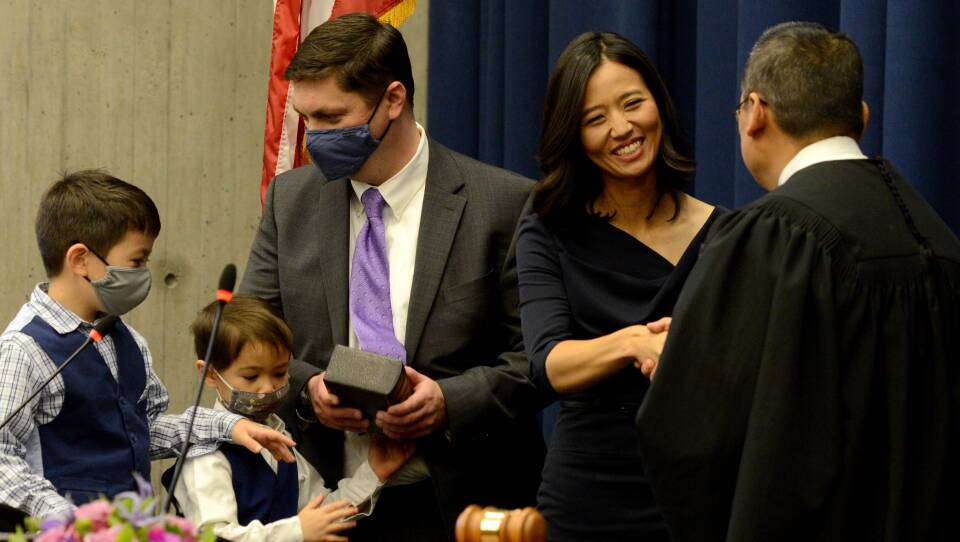Every Monday, GBH News assignment editor Matt Baskin joins GBH’s All Things Considered to look at the biggest stories of the upcoming week. Baskin tells host Arun Rath that, this week, city and state politics will take up airtime with news coming from Boston Mayor Michelle Wu and Gov. Maura Healey. Plus, the ongoing infrastructure woes of state projects that keep losing out on federal grants.
Do you know other stories we should be following? Email the newsroom at GBHNewsConnect@wgbh.org .
Arun Rath: So what's first on our list this week?
Matt Baskin: Michelle Wu is first on our list. This week, she's giving her very first State of the City address on Wednesday evening from the MGM Music Hall over by Fenway Park. Wu, of course, took office back in 2021 late in the year — she didn't give the State of the City in January 2022, since she'd only been in office for a couple of months. The mayor's first year-plus in office has been an intense one. She's had a lot to tackle. Continuing problems at Mass. and Cass , legal fights over the city's vaccine mandate for workers , a school district that very nearly went into state receivership , contract talks with the police department she's trying to reform.
What's front and center right now, though — and what I think we'll learn more about in her State of the City address — is the mayor's effort to bring back rent control. She's calling it rent stabilization. Rent control was banned in Massachusetts almost 30 years ago. It was voters themselves who did away with it through the ballot initiative in 1994. But, obviously, things have changed since the ’90s and the housing market, whether you're a buyer or a renter, is wild. As the mayor of the biggest city in the state, Mayor Wu’s trying to make it an option again. We don't have a ton of specifics just yet, but we know that she wants to tie rent increases to inflation and cap rent hikes at 10% each year.
Getting this through is not going to be easy. She's first going to have to convince the city council, and we already know that some councilors are reluctant. And she's also going to have to get this through Beacon Hill. As a home-rule petition, it will need approval from the Massachusetts House and the Senate and from Governor Maura Healey. So, long story short, our Boston City Hall Reporter Saraya Wintersmith will be covering Mayor Wu's State of the City, how she frames her rent control — or rent stabilization — plan and how it's received.
Rath: Now, you mentioned Gov. Healey: housing has been one of her priorities coming into office. Looking now at the state level, what are some of the things happening that we'll be looking at at the state level this week?
Baskin: So first off, the budgeting process is about to begin, and it'll be the governor's first go-round with it — her first chance to really lay out her spending priorities. There's a hearing scheduled tomorrow in which folks from the Healey administration and the budget writers in the Legislature will hear from economists about what the state can expect in terms of revenue for the fiscal year that starts in July.
I should say: the budget process is a long one. Massachusetts very frequently misses its July 1st deadline and doesn't get things wrapped up until later in the summer, so we'll be covering this for many months to come. But it'll give us hard proof of what the Legislature really cares about and what the new governor really cares about.
The other big state issue that's playing out is the start of sports betting. It's been a long time coming and, all of a sudden, it's set to begin next week. Encore Boston Harbor — formerly Wynn Boston, the casino over in Everett — is holding an event on Wednesday to explain to the public and to the media exactly how this is going to work, at least at their venue. And our Morning Reporter Mark Herz will be there.
Rath: Speaking of budget priorities, I got to ask about infrastructure. In particular, we've been hearing about the troubled plan to replace the bridges to Cape Cod — also the plan to revamp the Mass Pike as it runs through Allston .
Baskin: In both cases you just mentioned, Massachusetts went looking for federal money to help get these projects done. And for both projects, the feds have said no. Our transportation reporter, Bob Seay, is covering this, as are our colleagues at WCAI, our sister outlet down in Cape Cod. There are some really big open questions about where these two projects go from here. And there's actually a meeting tomorrow night on the Cape Bridge redesign plan. We'll be at the meeting, and we will have news to share.









